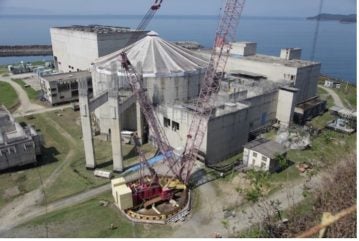
The Brazilian nuclear utility Eletronuclear, a subsidiary of the national electricity group Eletrobras, has won its appeal before the Rio de Janeiro Court of Justice to remove an embargo on work to complete the 1,350 MWe unit 3 at the Angra NPP in Angra dos Reis.
The Court of Justice of Rio de Janeiro upheld an appeal filed by Eletronuclear prohibiting any new embargoes on work at the unit for a period of 90 days, while an administrative process is analysed. In a unanimous decision, the judges of the 7th Chamber of Public Law partially granted Eletronuclear’s appeal, determining that the City of Angra dos Reis should finalise the process for renewing the licence permit that would ensure the legality of the works. Thus, for the next 90 days, while the process is administratively evaluated, the municipality is prevented from embargoing the work.
Construction of Angra 3, which features a Siemens/KWU pressurised water reactor, began in 1984 but was suspended after two years. The project resumed in 2006 and first concrete was poured in 2010. However, work stopped again in 2015 following allegations of corruption involving government contracts. The unit was then 65% complete. In 2022, Eletronuclear ordered construction to restart but in April 2023 the city government of Angra dos Reis ordered work to stop again citing various issues including the promised payment of compensation.
In the complaint made to the Court, Eletronuclear filed a request for a writ of mandamus, arguing the absence of irregularities in the issues highlighted by the embargo promoted by the city of Angra last year. Although an injunction had initially been granted by the lower court, it had been revoked in a ruling. In June, the injunction was restored on appeal and has now been confirmed on appeal. Considering the importance and magnitude of the work, the Court deemed the 90-day deadline appropriate and suggested the possibility of mediation to resolve the impasse between the parties.
According to Tribuna Livre, the immediate issue is just political and due to stubbornness on the part of the Angra mayor, Fernando Jordão, in refusing to grant a licence for the work before receiving from Eletronuclear compensation due to the city, which exceed the BRL260m ($45m). “However, the stoppage of the Angra 3 work, depends much less on an end of this local imbroglio, than on the federal government’s own momentary uncertainty regarding the cost of completing the new plant and the difficulties of financial management at Eletronuclear itself.”
In September, Eletronuclear finally received the results of a study on unit 3 of the Angra NPP prepared by the National Bank for Economic & Social Development (BNDES – Banco Nacional de Desenvolvimento Econômico e Social). The BNDES study looked into the technical, economic and legal feasibility of the project. It concluded that overall cost of abandoning Angra 3 may exceed BRL21bn, while the cost to finalise the construction is estimated at around BRL23bn, and the amount already invested in the work is almost BRL12bn. The plant is expected to enter commercial operation in 2031.
The study has been to the Ministry of Mines & Energy (MME) and shareholders (ENBPar and Eletrobras). MME will then forward it to the National Energy Policy Council (CNPE – Conselho Nacional de Política Energética), which will decide whether or not to complete the plant.
Angra NPP has two operating pressurised water reactors (PWRs) – the 640 MWe Angra 1, supplied by US Westinghouse Electric Company, which was connected to the grid in 1985 and the 1,350 MWe Angra 2, supplied by Siemens, which began operation in 2001.






